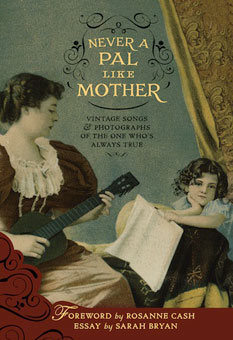
Dust-to Digital CD (DTD-19)
96 page hardback photo book with 2 CDs
Essay by Sarah Bryan; Foreword by Rosanne Cash
65 sepia photographs
The CDs feature 40 vintage recordings from 1927-1956.
Reviewed by Ben Greenman (http://www.newyorker.com)
The Atlanta-based independent record label Dust-to-Digital is chiefly known, for better and for worse, for its 2003 gospel box set “Goodbye, Babylon.” It’s for the better because the set’s meticulous presentation (songs compiled by the label’s founder, Lance Ledbetter, and released in a cedar box designed by Susan Archie) was without compare; it established a standard that other labels have tried, mostly in vain, to emulate. It’s for the worse because the label has continued to release impressive sets of vintage music that don’t always get the attention that “Goodbye, Babylon” received (though Dust-to-Digital’s “Art of Field Recording” series, which drew on the work of the folk revivalist Art Rosenbaum, was the subject of a New Yorker piece by Burkhard Bilger in 2008).
“Never a Pal Like Mother,” the label’s nineteenth release, collects forty songs about motherhood from the first half of the twentieth century; the music—furnished by famous collectors like Joe Bussard—is complemented by a book of liner notes, essays, and vintage photographs. The folklorist and collector Sarah Bryan, who provides some of the photographs, also supplies an essay focussing on the way the period shifted the concept of motherhood: how wars, Westward expansion, and immigration divided families just as advances in technology, especially cheap cameras, made it easier to remember them. “Each generation knew what it was to miss home and mother,” she writes. “This shared nostalgia became a mainstay of pop culture.”
Some of the songs in “Never a Pal Like Mother” will be familiar to even casual fans, such as Robert Wilkins’s “That’s No Way To Get Along,” the basis for the Rolling Stones’ “Prodigal Son.” Others won’t be, like the rare calypso “Mother’s Love,” by Mighty Destroyer. Elsewhere, there is close-harmony country (“God Bless Her (’Cause She’s My Mother),” by the Louvin Brothers), hillbilly exemplum (“Mama Says It’s Naughty,” by The Maddox Brothers & Rose), sentimental balladry (“The Pal That’s Always True,” by Doc Hopkins, which gives the set its name), and idiosyncratic gospel (“A Mother’s Last Word To Her Daughter,” by the great Washington Phillips, who accompanied himself on a strange stringed instrument, possibly of his own construction, that no one has ever been able to exactly identify).
Many of the groups were popular in the twenties and thirties and have since faded from memory: the McNulty Family, the Dixieland Jug Blowers, Leo Soileau. There’s even “Mama Don’t Allow It” by the legendary Frankie (Half-Pint) Jaxon, who sang in a high, feminine voice and in fact worked as a female impersonator before retiring from music and going to work at the Pentagon, of all places.
Though motherhood is the dominant theme—this is roots music about the root of the species—it’s not the only one: songs touch on sex, money, politics, and (frequently) religion. Roseanne Cash’s short, sharp introduction laments the disappearance of the world that produced music like this. “These songs,” she writes, “could never be written in the age of jet travel, therapy, delayed adolescence, the internet, nor could they survive current popular ideas of human psychology.” Her point is taken (songs like “Little Moses,” popularized by the Carter Family but heard here in a version by Mr. and Mrs. Harmon E. Helmick, sound especially ancient), but many songs do suggest later treatments of the same topics. The Carter Family’s “Hold Fast to the Right,” with its scene of maternal advice, points to Smokey Robinson and the Miracles’ “Got a Job”; “Mother Bowed” by the Pilgrim Travelers looks ahead to Paul Simon’s “Loves Me Like a Rock”; and the Carolina Twins’ “Where Is My Mamma?” is a direct ancestor of John Lennon’s “Mother.”
Tags: Dust-to-Digital
Leave a comment